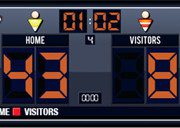The Clock Never Runs Out on Legal Business Development
Sports is a great teaching forum for lessons about business development.
In last weekend’s Super Bowl, the Denver Broncos’ fate was sealed by the beginning of the fourth quarter. There’s always some possibility that a team can make a comeback, but 28 points down with 15 minutes to play takes that possibility almost to zero.
A friend observed that, in the 4th quarter, the Seattle Seahawks were playing just for fun, sure of a win. But here’s the thing: they continued to play hard until the last possession. Not because they “needed” to – even a few mistakes and turnovers probably would not have changed the outcome of the game – but because those who excel in any field continue competing against themselves even when they’ve achieved the initial goal. Not “Whew, we’ve won, let’s relax now,” but “Yes! We won! Now let’s see how far we can take this win!”
And by the same token, even when every player and every fan had given up hope of a Broncos victory, the Broncos continued to play as best they possibly could. Although they didn’t play anywhere approaching the level that got them into the Super Bowl, they didn’t give up just because it was clear they were going to lose. Instead, they kept fighting to minimize the loss.
What does this have to do with legal business development? It’s all about attitude. Attitude, mindset, mental approach, belief system – all of these concepts describe not just what you do, but how you do it.
Where do you stop yourself when you’re succeeding? This shows up most frequently in the feast/famine cycle: stopping your business development work simply because you’re too busy and don’t need the work…Right up until the moment that you realize you don’t have enough work, and you have to start all over again. If things are going well, how can you ensure that you’re pushing the envelope to make things go even better?
Even more importantly, where do you stop yourself when you’re not succeeding? It doesn’t take a failure to knock some people off their game. Sometimes it’s just being slow to get results. We all want to see speedy success, but especially when it comes to bringing in new business, it doesn’t always work that way. That’s why it’s so important to check your metrics. Are you making progress toward your objectives? (And that’s why it’s important to set goals, so that you can measure progress and not just movement.)
Of course, sometimes failure is final. A critical skill is knowing when to keep pounding away and when to change course. (For more on this, see Seth Godin’s short and smart book The Dip. You’ll find my review here.)
How you choose to push yourself or back off is telling when it comes to whether you’re likely to succeed in building a consistent pipeline of new business. Next time you meet a business development goal you’ve set, ask whether there’s something more you can and should do to exceed that goal. Push yourself just a bit further. And if you catch yourself thinking that you failed or that your plan is never going to work, take a breath, question your assumptions (which often requires some outside help), and see what you can do to transform your failure into success.
Because here’s the truth: the clock never runs out on business development as it does on a football game. You don’t have to accept poor results as the end of the story. Instead, you can reevaluate your plan, reshape your strategy, rethink your objectives, and get some help. Keep fighting smart, and your failure will not be final.
Struggling with failure? Legal Rainmaking Myths offers a full section on the misapprehensions that keep smart lawyers from succeeding in legal business development. Find the Kindle version here; the print version will be available in a few weeks.




Leave a Reply
Want to join the discussion?Feel free to contribute!